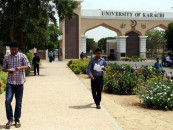Transnational issues: Diplomats call for international cooperation to fight extremism
Senator Mushahid Hussain says it is poignant that violent extremism is often presented as a Muslim problem.

STOCK IMAGE
They emphasised the need for cooperation among states both at government level and people to people to fight the menace, said a press release.
Speaking at the opening session of a two-day international seminar on “Countering Violent Extremism: Global Action Plan” organised by the Centre for Pakistan and Gulf Studies in collaboration with Konrad Adenauer Stiftung (KAS), the speakers looked into the evolution of violent extremism as legal and political challenge; international perspectives and response strategies; and Pakistan’s own experience of fighting the problem.
Violent extremism was one of the biggest challenges of the 21st century, which has transcended borders and is now present across the world, insisted President CPGS Senator Sehar Kamran.
Senator Kamran called for a multi-dimensional global response to counter the threat. She linked the problem of violent extremism to a ‘hydra-headed monster’ and said that a comprehensive approach was required for dealing with it by addressing issues like conflicts and disputes; foreign interventions and occupation; religious, racial and ethnic discrimination; and persecution as well as social and economic exclusion that tended to promote this problem.
“The complex challenges of terrorism and violent extremism defy simplified solutions. The causes of terrorism and violent extremism are multiple and need a comprehensive response from the international community,” she said.
Furthermore, Senate Defense Committee Chairman Senator Mushahid Hussain in his keynote presentation regretted that violent extremism was often presented as a Muslim problem. He said the historical perspective of the problem needed to be kept in mind for its fuller comprehension.
He was of the view that actions by global powers based on their respective strategic calculations led the world to the current state where its security was being challenged. Emphasising on his contention, Mushahid recalled that al Qaeda was a product of Afghan jihad, while Daesh was a result of the Iraq war.
“Till we attack the core questions and root causes and are aware of the political context it would be difficult to counter the problem,” he said and suggested speedy resolution of outstanding disputes, criminalising Islamophobia and promotion of democracy in Muslim countries.
Focusing on extremism in Afghanistan, Afghan Ambassador Janan Mosazai spoke about the country’s response to the problem. Mosazai said that Afghanistan’s fight against terrorism was not only for its own security, but that of the entire region. He underscored the need for regional cooperation to counter the growing threat of terrorism and extremist violence. But, he regretted that the states in the region have still not agreed on the basic principles that could form the basis of cooperation.
“We have to keep asking ourselves the questions that having suffered so much at the hands of terrorists groups are we ready to suffer from another group for another decade. If the answer is no, we then need to rethink our policies and strategies and move towards state-to-state cooperation.”
Leading international law expert and former law minister Ahmer Bilal Soofi, while speaking about the legal aspect of the issue, said the challenge facing the states was how to balance the citizens right to freedom of speech against their actions for preventing non-state actors from propagating radical views particularly the regulation of the cyberspace.
Published in The Express Tribune, September 10th, 2015.



















COMMENTS
Comments are moderated and generally will be posted if they are on-topic and not abusive.
For more information, please see our Comments FAQ